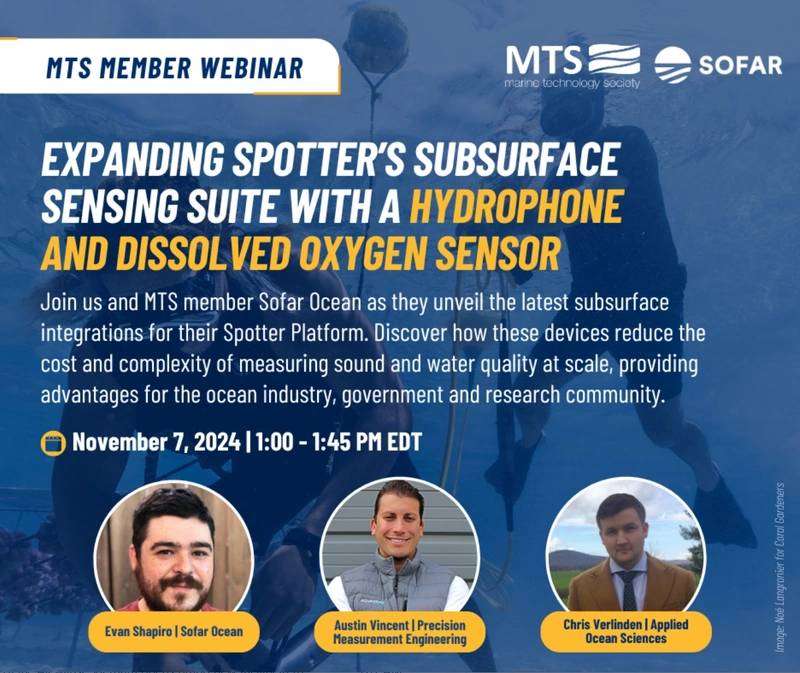Join the Marine Technology Society (MTS) and MTS member – Sofar Ocean – on November 7th at 10 AM PST / 1 PM EST for a webinar moderated by Sofar Ocean Chief Technology Officer (CTO) Evan Shapiro. Sofar Ocean will introduce two new subsurface integrations for their Spotter platform: a hydrophone and a dissolved oxygen sensor.
Evan will be joined by Chris Verlinden of Applied Ocean Sciences (AOS) and Austin Vincent of Precision Measurement Engineering (PME), who will detail how they used the Bristlemouth connectivity standard and its open source protocol to efficiently integrate the new sensors with Spotter. Sofar will highlight how the devices lower the cost and complexity of measuring sound and water quality at scale, benefitting the ocean industry, government and research community. A Q&A will follow the presentation. Click here to register.
Date and Time:
Thursday, November 7, 2024 | 1:00 – 1:45 PM EST
Presenters:
Evan Shapiro – Sofar Ocean, CTO
As CTO of Sofar Ocean Technologies, Inc., Evan’s research and development efforts are focused on strengthening the connection between the world’s oceans and the humans who depend on them (all of us). This is achieved by driving unprecedented scalability in distributed ocean sensing systems, and unprecedented accessibility to the data they produce. Specifically, he is currently focused on increasing the scale of ocean sensing systems by reducing cost, complexity, and operational envelope of our sensing platforms Spotter and Smart Mooring; increasing the flexibility and extensibility of these systems by leading the design, development and broad adoption of Bristlemouth – an open marine hardware connectivity standard; and increasing the value and accessibility of of data collected by sensing systems by leveraging ML and AI (both on the edge and in the cloud) to distill simple human-level insights and decisions from messy and inscrutable raw sensor and rich model data.
Austin Vincent – Precision Measurement Engineering, Product Specialist
At PME/Aquasend, Chris manages collaborative efforts across a diverse network spanning research scientists, government-funded environmental agencies, international distributors, esteemed academic research institutions, and aquaculturists across 25+ countries worldwide. The aim is to deliver cutting-edge water quality instrumentation to help solve some of the world’s most complex water measurement challenges.
Chris Verlinden – Applied Ocean Sciences, CTO
Dr. Chris Verlinden has extensive military experience, drawing from a 14-year career as an officer in the U.S. Coast Guard. He has worked with the Office of Naval Research and Naval Research Laboratories extensively on projects ranging from seismic exploration to ocean acoustics and signal processing.
Specifically, Dr. Verlinden is a subject matter expert in the use of large vertical aperture arrays (LVAs), and making environmental inferences using passive and source-of-opportunity acoustic noise. He graduated from the Coast Guard Academy with High Honors with a degree in Marine and Environmental Sciences in 2008, whereupon he was stationed aboard the Coast Guard Icebreaker Polar Sea as the Science Officer for two years. Research missions while serving aboard Polar Sea ranged from methane hydrate research to capturing polar bears. In 2010, Dr. Verlinden transferred to USCGC Sycamore out of Cordova, Alaska where he served as Operations Officer for two years. During this time, Dr. Verlinden served as task force leader for on-scene Coast Guard assets during the Deepwater Horizon oil spill, and as project officer for oil spill response exercises in support of Operation Arctic Shield, earning five arctic service medals in the process.
Dr. Verlinden earned an M.S. in Oceanography from Scripps Institution of Oceanography in 2014 with research focused on passive ocean acoustics and the information content of ocean noise, and completed his Ph.D. in Applied Ocean Sciences at Scripps in 2017, with research focusing on passive acoustic source localization and environmental inversion. In 2014, Dr. Verlinden began teaching at the U.S. Coast Guard Academy in the Marine Science section. Dr. Verlinden holds numerous professional certifications including commercial vessel captain’s licenses, FAA sUAS operator licenses, and Geospatial Technology certifications; he worked for both the USCG and OASIS before cofounding AOS in 2019.

